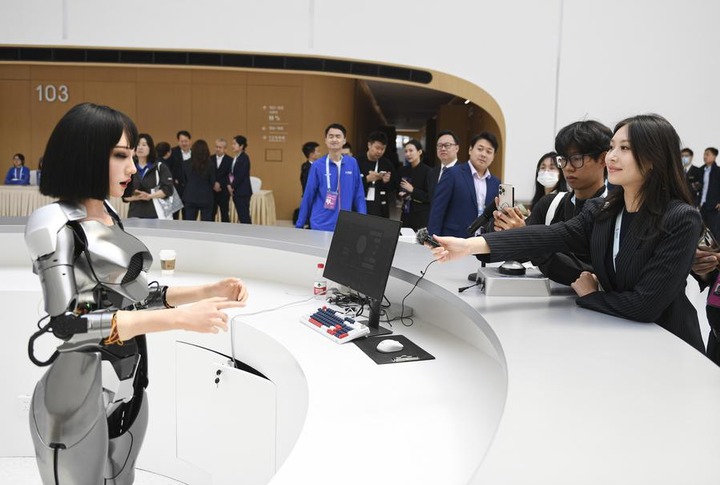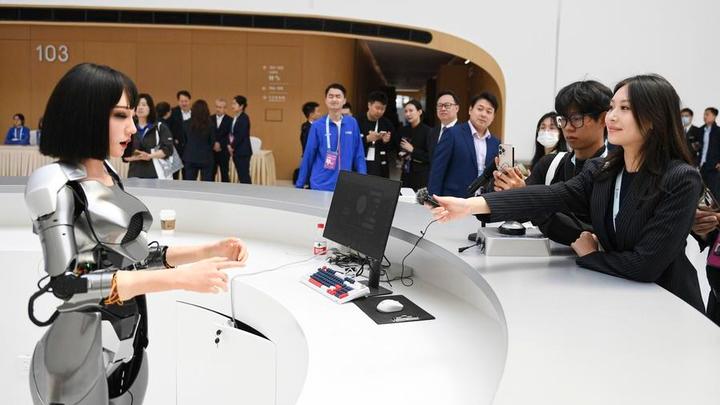
Journalists interact with a bionic humanoid robot at the Zhongguancun International Innovation Center, new venue for Zhongguancun Forum (ZGC Forum), in Beijing, capital of China, April 24, 2024. (Xinhua/Chen Zhonghao)
BEIJING, May 16 (Xinhua) -- China's artificial intelligence (AI) sector is witnessing advancements, with the number of enterprises in the field topping 4,500, according to data recently released by the Ministry of Industry and Information Technology (MIIT), reported Economic Daily.
Innovative breakthroughs such as intelligent chips and general large models are emerging rapidly. The development of intelligent infrastructure continues to gain momentum, with construction of digital workshops and smart factories accelerating, laying a solid foundation for the integration of AI into the new landscape of industrialization.
Making full use of China's complete industrial system, vast industrial scale and diverse application scenarios, the country is promoting deep integration of AI with manufacturing, according to Tao Qing, head of the bureau for operation, monitoring and coordination with the MIIT.
Prioritizing intelligent manufacturing and meeting demands for scenario application, the goal is to propel intelligent transformation of the manufacturing sector, providing new impetus for high-quality development, said Tao.
-- Accelerating breakthroughs in key technologies
AI stands as a strategical technology guiding the new round of technological revolution and industrial transformation, as well as a vital impetus for new industrialization. Accelerating the breakthroughs in key fundamental technologies of AI is essential to empowering its application.
Efforts should be made to promote technologies and products such as intelligent chips, large models that rely on basic technologies of algorithms and computing power, said Tao, noting the need to speed up the deployment of intelligent Internet of Things (IoT) terminals and industrial clouds to enhance computing power supply and operational management capabilities of manufacturing.
It is also important to guide swift development of globally competitive large models, especially industry-oriented models for manufacturing scenarios, as well as to establish high-level industrial database to unlock the value of industrial data elements.
Only through integration of the three core elements of computing power, algorithms and data, can we bring the AI Plus initiative into industries and truly achieve industrial intelligence empowerment, said Yin Ping, a representative with Chinese IT firm Inspur.
In recent years, China's computing power has achieved rapid development. By the end of 2023, the total size of China's data center racks had reached 8.1 million standard racks and the scale of computing power had exceeded 230 EFLOPS, according to Shan Zhongde, vice minister of industry and information technology.
Computing power has been a key factor constraining AI development, said Fu Changwen, general manager of CCID Consulting Co., Ltd., a subsidiary of the China Center for Information Industry Development (CCID) under the MIIT. With rapid advancement of AI and the ongoing digitalization of industries and enterprises, the demand for intelligent computing centers is growing, according to Fu.
Digital economy, driven by digital technologies, is developing rapidly and in an all-round manner. Innovation based on digital technologies has become a vital pillar for developing new quality productive forces, according to Su Bo, director of the National Intelligent Manufacturing Expert Committee.
-- Expanding diverse application scenarios
In 2023, IT technologies represented by generative AI triggered new revolution in the intelligent era, becoming a driving force for innovation across various industries. The goal of the AI Plus initiative is to actively apply AI to empower real economy by enhancing efficiency and promoting high-quality development, so as to bring in new industries, new models and fresh momentum to various sectors, said Zhang Li, president of the CCID.
China boasts a broad and diverse range of AI application scenarios, presenting vast opportunities for the AI Plus initiative. AI has been widely applied in fields such as imaging, retail, manufacturing, finance and healthcare. These applications are reshaping production modes and economic forms, improving production efficiency, lowering production costs, and boosting industrial competitiveness on the global stage.
For instance, at the recently concluded 14th Beijing International Film Festival, two classic films released over 40 years ago were re-premiered in brand new 4K versions, with help of generative AI visual large models.
In Weihai, east China's Shandong Province, fishing boats entering the port would be immediately spotted by a fishery inspection and recording system on the shore. Infused with AI technology, the high-tech "receptionist" helps quickly confirm identity of the ships, significantly improving the efficiency of verification.
The AI technology has also been used to improve quality management efficiency and provide convenient services for consumers in purchasing goods. For example, e-commerce platform Dewu has managed to ensure quality of goods by establishing an AI inspection and identification production line. The AI computing engine, trained on years of research and vast data accumulated by the platform, can assist in improving inspection and identification efficiency.
It is necessary to deepen the integration of AI technology throughout the entire process of manufacturing, significantly improving the intelligence level of various stages including research and development, pilot testing, production, services, and management, according to Tao.
Targeting key industries with significant impact on the national economy, strong driving force and solid digital foundation, special actions will be undertaken to empower new industrialization with AI, accelerate the intelligent upgrade of key industries, and enhance the intelligence level of key products and equipment, said Tao. (Edited by Yu Huichen with Xinhua Silk Road, yuhuichen@xinhua.org)




 A single purchase
A single purchase









